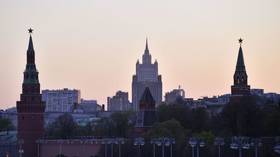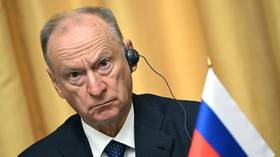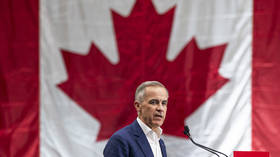Countries may cut dollar holdings after Russian reserves frozen – IMF

Global economies will be rethinking how safe it is to rely on the US dollar in their foreign currency holdings, the deputy head of the International Monetary Fund, Gita Gopinath, said on Tuesday.
The statement comes after half of Russia’s forex holdings were effectively confiscated by international financial institutions amid sanctions placed on Moscow following the launch of its military operation in Ukraine.
“We are likely to see some countries reconsidering how much they hold of certain currencies in their reserves,” she stated in an interview with Foreign Policy magazine.
Gopinath said the IMF sees “increasing fragmentation” in global payments systems as one of the consequences of the current events. However, she stated that the US dollar, traditionally considered the world reserve currency, is not likely to suffer an “imminent demise.”
Still, depending on how long the crisis in Ukraine lasts, there could be larger effects, Gopinath said.
Touching on the prospect of Russia’s sovereign debt default, the senior IMF official said its potential impact on the global economy would be limited and would not pose a “systemic risk,” because the “numbers that we’re looking at are relatively small from a global perspective.” On the other hand, for Russia, a default would have long-term consequences, Gopinath added.
“When you’ve defaulted, reentry into the market is not easy. And that can take a long time.”
The sanctions placed on Russia over the past month have effectively cut the country’s ties to the Western financial system, banning most transactions except for debt repayment operations and oil purchases, at least for now.
The measures also froze around $300 billion that Russia holds in foreign currency reserves abroad. International credit rating agencies earlier this month lowered Russia’s rating to pre-default, predicting that Moscow will not be able to fulfill its obligations to foreign creditors. Russia has so far averted default, making a $117 million interest payment on two dollar-denominated bonds last week. Media reports also said that Russia made another $66 million debt payment in US dollars on Tuesday.
Moscow has repeatedly stated that it is fully capable of repaying its debts, and could even make the transfers in the national currency, the ruble, if other options are exhausted.
However, according to Moody’s Investors Services, there is still the danger of missed payment, as the exemption from sanctions on Russia’s debt operations expires on May 25, while Moscow still has payments worth $100 million due on May 27. Moody’s said that after that date, Russia’s creditors “will require a specific license to continue to receive debt repayments, which will further impair investors’ ability” to receive their funds.
Russia has accused the US and its allies of trying to engineer an artificial default, since the country has the money to pay its debts. Moscow says it is the Western financial institutions that are in default, because by freezing the country’s assets, they are failing with regard to their obligations.
For more stories on economy & finance visit RT's business section















